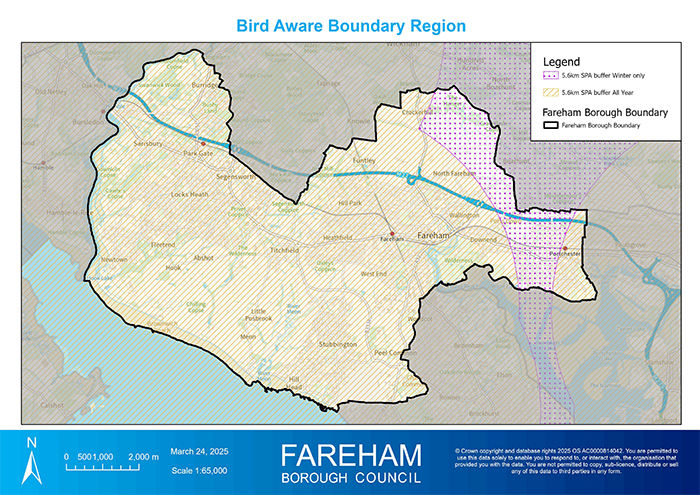
Some of these cookies are necessary to make the site work. We’d also like to use optional cookies to help improve your experience on the site. You can manage your optional cookie preferences below. Using this tool will set a cookie on your device to remember your preferences. Your preferences can be changed at any time.
For further details, see our Cookie Policy and our Privacy Policy
Essential cookies enable core functionality such as page navigation and access to secure areas. The website cannot function properly without these cookies; they can only be disabled by changing your browser preferences. Third party functions such as Google Search and Analytics will not be enabled.
Performance settings enable you to use the Google Search engine on our website and help us to improve our website by collecting and reporting information on its usage (for example, which of our pages are most frequently visited).
Bird Aware Solent is a partnership of local councils and conservation bodies, funded by fees paid by developers of new housing. It raises awareness of the ducks, geese and wading birds that spend the winter on our special coastline. Its work is overseen by the Partnership for South Hampshire.
The partnership was set up to meet the requirements of the Conservation of Habitats and Species Regulations – which set out how local planning authorities handle planning applications that have potential to impact on wildlife sites. By law, consent cannot be granted for a development which would, on its own or in combination with other developments, be likely to have a significant effect on designated habitat sites, unless full mitigation is provided. Housebuilders can provide mitigation themselves but, in many cases, developers choose to meet this requirement by making a contribution which is paid to the Bird Aware Solent Partnership.
The Council has used the Bird Aware Solent Strategy since March 2018 for all new residential development within 5.6km of the SPAs.
Bird Aware Solent has recently (with effect for any planning permissions granted from 1 April 2025) updated and enhanced its Strategy following a comprehensive, robust and positive review of its work to date.
The review has extended the scope of Bird Aware's work to include protected breeding birds who are on parts of our coast during the summer months. This is in response to the findings of a review of the likelihood of increased recreation from new housing impacting breeding birds  . This review indicated likely significant effects for these species without mitigation being secured. The Revised Strategy will provide mitigation that allows house building to continue in the Solent area. It remains an opt-in Strategy and developers are still able to provide their mitigation requirements through a bespoke scheme if they choose.
. This review indicated likely significant effects for these species without mitigation being secured. The Revised Strategy will provide mitigation that allows house building to continue in the Solent area. It remains an opt-in Strategy and developers are still able to provide their mitigation requirements through a bespoke scheme if they choose.
The contributions from 1st April 2025 are as follows. These are updated annually on 1 April in line with the Retail Price Index (RPI):
| Bedroom Size | All Year | Winter Only* |
| 1 | £482 | £434 |
| 2 | £696 | £627 |
| 3 | £907 | £817 |
| 4 | £1,067 | £961 |
| 5+ | £1,251 | £1,126 |
| Flat Fee* | £805 | £725 |
* Usually only used in cases of caravans, tents or gypsy and traveller sites
The two strategy areas are indicated on the following Bird Aware Boundary Region map ![]() (2 MB):
(2 MB):

Full details of the Revised Strategy are available on the Bird Aware Solent website. 
Updates to the Strategy include: an enhanced dog walkers' engagement programme; an enhanced monitoring programme and an extension of scope to include breeding birds. The duration of the Strategy has been extended until 2050 with the in-perpetuity element provided until 2130.
Around 147,500 new homes are anticipated around the Solent up to 2050. This is likely to lead to more people visiting the coast for recreation and this has the potential to cause more bird disturbance. The Revised Strategy aims to mitigate likely impact of bird disturbance as a result of these additional homes and the resulting increase in recreational visits. It focuses on educating people about the birds and encouraging positive behaviour change.
The Updated Strategy has been endorsed by the Partnership for South Hampshire's Joint Committee and is currently progressing through the approval process of all the Local Planning Authorities in the Solent. Subject to final approval, it comes into effect for any planning permissions granted from 1 April 2025.
Please contact us if you have any questions about the Strategy.
The Solent Waders and Brent Goose Strategy is a conservation partnership project, which aims to conserve the internationally important brent goose and wading bird populations within and around the Special Protection Areas and Ramsar wetlands of the Solent coast.
Development on some sites has the potential to affect directly sites used by waders as feeding and nesting grounds. Applicants need to consider whether this is true of their site. On some sites, adverse effects may be mitigated while some development will be considered unacceptable without suitable replacement habitat secured in perpetuity.
More information is available on the latest Solent Waders & Brent Goose Strategy  or the on map of the Solent Waders & Brent Goose Strategy Network
or the on map of the Solent Waders & Brent Goose Strategy Network  .
.
Find out more about Bird Aware Solent  .
.
 Back to Top
How to get here
Back to Top
How to get here
